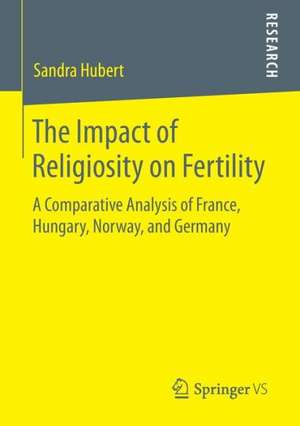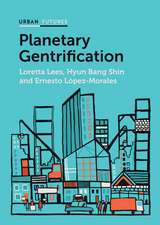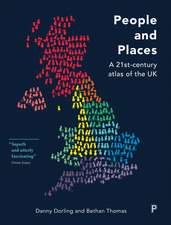The Impact of Religiosity on Fertility: A Comparative Analysis of France, Hungary, Norway, and Germany
Autor Sandra Huberten Limba Engleză Paperback – sep 2014
Preț: 387.20 lei
Nou
Puncte Express: 581
Preț estimativ în valută:
74.09€ • 77.62$ • 61.41£
74.09€ • 77.62$ • 61.41£
Carte tipărită la comandă
Livrare economică 09-23 aprilie
Preluare comenzi: 021 569.72.76
Specificații
ISBN-13: 9783658070076
ISBN-10: 3658070072
Pagini: 297
Ilustrații: XIV, 283 p. 13 illus.
Dimensiuni: 148 x 210 x 20 mm
Greutate: 0.4 kg
Ediția:2015
Editura: Springer Fachmedien Wiesbaden
Colecția Springer VS
Locul publicării:Wiesbaden, Germany
ISBN-10: 3658070072
Pagini: 297
Ilustrații: XIV, 283 p. 13 illus.
Dimensiuni: 148 x 210 x 20 mm
Greutate: 0.4 kg
Ediția:2015
Editura: Springer Fachmedien Wiesbaden
Colecția Springer VS
Locul publicării:Wiesbaden, Germany
Public țintă
ResearchCuprins
Demographic patterns in comparative perspective.- Religion and religiosity.- How religious affiliation and religiosity affect fertility.- The national frame and individual characteristics.- Empirical analysis in comparative perspective.
Recenzii
“The volume offers an overview of the different channels through which religion and religiosity matter for fertility in selected, different institutional settings in Europe. The first part of the volume presents an excellent state-of-the-art of the topic, providing a first-rate starting point for beginners as well as a well-organized review for experts. The second part suffers from some methodological problems, but offers a basis for future, longitudinal research on the ‘impact’ of religiosity on fertility.” (Daniele Vignoli, European Journal of Population, Vol. 31, 2015)
Notă biografică
Sandra Hubert is a research assistant at the social monitoring department of the German Youth Institute (DJI) in Munich, Germany.
Textul de pe ultima copertă
The work investigates the impact of religiosity of women and men on their completed fertility in an international comparison considering a long time period. Sandra Hubert aims at uncovering all mechanisms through which religiosity and religious institutions can affect fertility. Hence, both the micro- and the macro-level of each country are explicitly integrated, and theoretically as well as empirically dealt with. The selection of differing countries rests upon the expectation that religiosity influences fertility decisions independently of the institutional context, social norms, state-church-relations, and the national degree of religious vitality. These factors are intensively compared with each other at the country level. At the micro-level the impact of religiosity on fertility is tested by means of regressions and based on the Generations and Gender Survey. Results depend on gender, country, the diverse religious affiliations, and more.
Contents
Sandra Hubert is a research assistant at the social monitoring department of the German Youth Institute (DJI) in Munich, Germany.
Contents
- Demographic patterns in comparative perspective
- Religion and religiosity
- How religious affiliation and religiosity affect fertility
- The national frame and individual characteristics
- Empirical analysis in comparative perspective
- Lecturers and students of Sociology, the Sociology of Religion, and Demography
Sandra Hubert is a research assistant at the social monitoring department of the German Youth Institute (DJI) in Munich, Germany.
Caracteristici
Sozialwissenschaftliche Studie Includes supplementary material: sn.pub/extras










